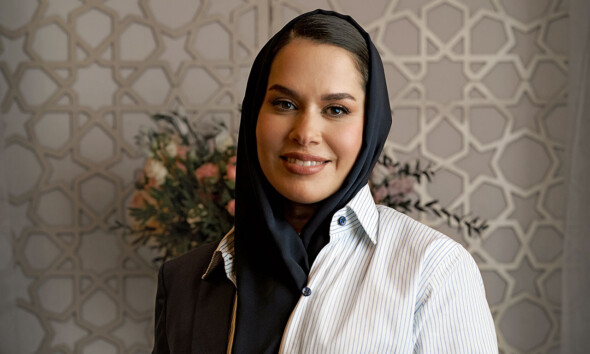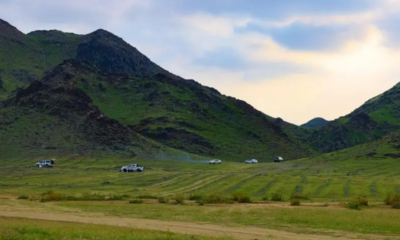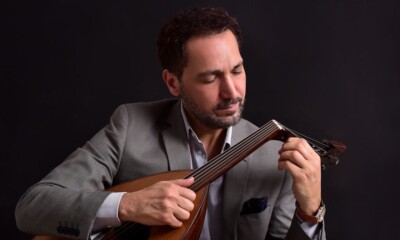Home » Interviews » Iraqi Moayad Al-Haidari to Arabisk London: I was raised in a home where books lined the walls, and my passions were painting and radio!
Interviews
Iraqi Moayad Al-Haidari to Arabisk London: I was raised in a home where books lined the walls, and my passions were painting and radio!
Published
6 months agoon
By
Huda
Moayad Al-Haidari, an artist, writer, and quiet radio broadcaster, stands out as a bright star in the creative sky in his dream-filled, colourful, book-filled, expatriate studio where dreams come true. He holds the memory of his native Iraq close to his heart, which inspires his ideas, colours, and drawings expressing longing and separation sentiments.
Interviewed by: Mohsen Hassan
Each line of artwork or brushstroke conveys a narrative, and each artistic stroke chronicles memories that shift between the streets of exile and the alleyways of boyhood. In addition to his passion for colour, this wonderful artist also uses words and poetry to convey his feelings, aspirations, and thoughts—embodying the problems facing his own country and the worries of those close to him.
His generation is a bridge between cultures as a media professional, and his exploration of arts, civilisations, and personalities is a valuable asset for those looking to make a name for themselves in a world full of challenges and upheavals.
In all his radio interviews with noble individuals, Moayad Al-Haidari highlights the importance of art, literature, and solid media as the link between cultures and peoples, regardless of their distance or the challenges they face in achieving security and peace.
Remarkably, prominent media personality and radio host Moayad Al-Haidari, presently based in the United States, has collaborated with Radio Sawa and Al-Hurra Channel in Washington, DC, since 2015. Before that, he spent over fifteen years managing the radio office in Baghdad and ten years at Radio Free Europe in Prague, the capital of the Czech Republic.
During that time, in addition to finishing hundreds of varied radio broadcasts, Moayad Al-Haidari had in-depth conversations with prominent and knowledgeable people in various industries.
Arabisk London interviewed Moayad Al-Haidari on Iraq yesterday, now, and in the future.
First, given the recent regional and global shifts, what is your assessment of the relationship between Iraq and the Arab world?
Iraq’s historical and current political relations, particularly with Arab nations, hold a prominent place in the scale of international and regional relations, which seem to be entwined in their renewed form in terms of the diversity of instruments, mechanisms, concepts, and interests. Due to conflicts, Iraq has experienced decades of confusion and alienation from these nations as well as the rest of the globe. The war with Iran preceded and followed the previous regime’s invasion of Kuwait.
These tragic circumstances significantly impacted Iraq’s international relations. However, it was one of the founding members of the Arab League and one of the first nations to sign the League of Nations Charter, making it difficult to neutralise or eliminate its political influence on regional issues and affairs.
After the events of 2003 and the overthrow of the regime, Iraq entered a perplexing phase of intersecting and overlapping interests of the powerful forces within it for various reasons and ends. A few of these involved using force to “confront the occupation,” while others had to do with the rise of new forces over the state apparatus that had other goals.
Professional gangs that committed acts of terrorism, sabotage, animosity, and stirring sectarian conflict also belonged to this era, in addition to clashing slogans and interests. All of these factors combined caused great harm to the Iraqis and reduced their connections with their neighbours both inside and outside of their country.
Regarding Iraq’s recent foreign relations, what does Moayad Al-Haidari think?
Notwithstanding the tragedy that Iraqis have experienced over the past few decades, particularly the last two, I observe that Iraq has started to realign its vehicle on the path of mutual interests.
Additionally, I observe that Iraq’s neighbours, both foreign and Arab (Iran and Turkey, in this case), have come to understand that this nation, with its significant economic, historical, and human resources, is one of the partners and influential actors in partnerships based on the exchange of interests in politics and the economy.
To put it bluntly, I say this: Yes, Iraq now holds the potential for a better future, provided it can overcome the internal problems caused by the current political and administrative structure and eradicate the evils of corruption, nepotism, favouritism, and vile sectarianism that impede the necessary modern development that Iraqis view as their ultimate goal in life.
What is the significance of the Iraqi-Saudi relationship for maintaining the equilibrium of ties between Baghdad and Tehran, in your opinion?
Iraq and Saudi Arabia are two significant regional hubs that connect each other by genuine, fundamental historical and social ties as two nations and two peoples. The eight-year conflict and the sharp decline in conditions that followed former President Saddam Hussein’s rash decision to invade Kuwait, however, have severely harmed this relationship in recent decades.
The decision between Baghdad and Riyadh shattered ideal relations and unsettled Arab relations at the time. However, the fresh air between leadership in both countries is encouraging and inspiring hope. There is a perception that efforts to strengthen collaboration and improve connections, particularly in social, cultural, and economic spheres, are now more obvious and motivated. 
Here, I recollect a phone conversation between the current prime minister of Iraq, Mohammed Shia al-Sudani, and the crown prince of Saudi Arabia, Prince Mohammed bin Salman, expressing the depth of their excellent connection.
As for the new Saudi Arabia, let me say that it promises to be a powerful, dangerous, large, and positive influence in the region. Al-Sudani claimed that the Saudi Crown Prince had told him directly, “I regard myself and my ministers to be your counsellors, and we are here to assist, offer our ideas, and offer advice.” Regrettably, this phrase was uncommon and unheard of in Arab interactions generally. However, it denotes a new consciousness and a forward-thinking perspective, understanding that the region’s peoples’ happiness as well as their development and prosperity are all contingent upon the presence of such close, sincere, and honest relationships to improve outcomes for all parties involved.
Iraqi-Saudi relations have improved due to shared religion, language, culture, ancient ancestry, and historical links between the two nations. The hope is for the relationship to strengthen and overcome any barriers that may hinder its progress.
How have you reacted to the Saudi-Iranian reconciliation as an intellectual from Iraq? What hopes does Moayad Al-Haidari have for this reconciliation going forward?
I generally agree with the statement that “religion is for God and the homeland is for everyone,” and that combining these ideas extremely undermines the prospects for prosperity and the advancement of many nations and their civilisations.
In my opinion, Iran, Saudi Arabia, Iraq, Turkey, and other powerful nations in the region should all have a common understanding of the interests of their peoples as well as the interests of the region as a whole.
This should be done in a way that upholds each nation’s dignity and fosters collaboration in the quest for a better future for our people, which is what we all believe in and aspire to, and I hope that future generations will embrace this idea.
What does Moayad Al-Haidari believe the Iraqi economy loses as a result of the exodus of its minds, intellectuals, and soft power?
Iraq’s creative energies—science, culture, medicine, art, and engineering—have been severely depleted by the brain and competency exodus. In my opinion, it is the worst loss Iraq has suffered since the wars, the political unrest, and the persecution of those who support particular ideologies or political parties.
Sadly, depending on the course and prospects of our nation’s political seasons, this has been going on for decades at various intensities and stages. Iraq has lost tens of thousands of highly skilled scientists and intellectuals, which, in terms of their contemporary and social worth as well as the human resource logic, equate to a vast amount of unreplaceable riches.
Iraq, once a highly developed nation, was the first to establish universities, colleges, and institutions in science since the 1920s. It had a solid reputation and ties to prominent international organisations, mostly in the West.
Despite resurrected expectations of averting the loss and attempting to compensate, the loss of creative energies is a significant loss and a painful bleed that is hard to repay. There have been major effects on the nation’s curricula, administration, and educational system.
Nevertheless, given Iraq’s generally, not entirely low level of university education and its inability to keep up with global advances in science, research, and teaching, as well as the integration of educational policies with societal needs and modernisation—which nearly incorporates all facets of contemporary life—I must admit to feeling sad and concerned about how society is developing.
Losing skills is a significant loss, but there are reasons to be optimistic. New generations’ seriousness, innovative educational policies, partnerships with international universities, and government policies that enhance human resource management can help. Despite the devastating loss, these factors contribute to a more optimistic future.
As a seasoned media practitioner, what is your assessment of the current state of Iraqi audiovisual media stations?
Indeed, as a media professional who has followed the advancements and modernisation of radio and visual media techniques, methods, and concepts, I find that most of the channels I follow (and there are a lot of them now that the atmosphere has opened up after the changes in April 2003) do not offer what I would like unless they rely on specialised energies and advanced and updated competencies in terms of their capabilities, ideas, philosophy, and creative tools in the media space.
Broadly speaking, the majority of Iraqi media outlets today are associated with certain political, religious, tribal, and regional identities! Many of them serve as representatives of politically orientated media, which regrettably causes media discourse to become a tool for promoting narrow, self-interested goals and blackmail rather than being used for social and intellectual tasks that foster awareness and instil ideas of solidarity, construction, and shared responsibility.
This shows up in the majority of the garbage that appears on Iraqi screens, which is typified by poor presentation, dreadful display, low-quality material, and simple terminology and tools. As a spectator and media professional, I am concerned that, in contrast to other media platforms that are adept at disseminating facts, concepts, and viewpoints and helping people make responsible decisions, cultivate critical thinking skills, and promote constructive, optimistic thinking, I and thousands of viewers are being subjected to a process of ignorance.
How pleased is Moayad Al-Haidari with the media portrayal of Iraqis abroad?
Although it is simple to discern between broadcasts coming from inside and outside of Iraq, it is challenging to assign an identity to the Iraqi media that is distributed abroad because foreign broadcasters are more liberated in their presentation and discussion of subjects and concepts.
Oddly, all the media outlets and stations, whether they are located in Iraq or not, have one thing in common: they all apply the notion of press and media freedom by using tactics like defamation, entrapment, and cruel criticism of others. Not to mention how common it is to use accusatory and complaining language to draw in viewers and listeners!
It seems that there is a persistent focus on empathy, grief, and mistreatment of the other, even to the extent of using derogatory language to disparage them. These actions are disrespectful, unwelcome, and unworthy of dignity, as they amount to nothing more than a self-serving manipulation of platforms, pulpits, and stations rather than demonstrating a genuine concern for the wider Iraqi crisis.
However, in your perspective, what is lacking at this level in this context?
Honestly, we lack the sobriety of specialised media here in the diaspora; instead, we prioritise empty rhetoric and entertaining but pointless arguments over discussions of research theses, important academic and scientific social affairs, and programs of cultural and cognitive value that interest and benefit the Iraqi recipient.
I fear that over time, even the government-funded stations (connected to the Iraqi Media Network) have become a megaphone for the government, just as previous generations have become accustomed to hearing from a single party and its unchanging leader. There’s a troubling conflation here between the national media system’s independence and its servitude as a mouthpiece and promoter of the government’s views alone.
In a manner that presents the first official, minister, or head of state as a benefactor in his own right rather than as a government employee carrying out his duties to the best of his ability to the people of his nation and his citizenry. This, in my opinion, is a problem that affects not only Iraqi media outlets but other Arab ones as well, necessitating a close examination of the nature and realities of the constructive media role.
Has Iraq managed to overcome sectarianism in the two decades after the dictatorship in Baghdad fell?
I recall everything that transpired in April 2003 both before and after I was born and raised in Baghdad, attended school, worked, studied, got married, had a child, and participated in a variety of social and cultural events.
The occupation of Baghdad and the overthrow of the regime led to neurotic crises, fueled by ill-founded sectarian notions. Many connected the regime change and occupation of Iraq with sectarianism and factional interests.
Sectarianism is a cancer that spreads quickly across communities and is difficult to eradicate, especially in administrative weightlessness and security phases. Therefore, sincere leaders and administrations should advise citizens against contracting this illness, as it has had a detrimental impact on the nation and all sects.
I sincerely hope for the recovery of the people and region from the devastating disease that has targeted everyone. Most societal sectors in Iraq have recovered from the disease. However, Iraqi politics leaders often use sectarianism as a tool to advance their agenda, starting with electoral contests and ending with government appointments and the benefits enjoyed by sect members, according to the head of state.
Politicians are responsible for igniting dangerous flames that confront the common citizen, who is purer and more innocent than those dressed in political uniforms. They carry a secret poison that is localised, factional, sectarian, and pure. They use social media to spread hate and promote sectarianism through their electronic army.
Iraqi residents are more truthful, tidier, and capable of fighting against strategies used to keep the populace in the dark and steer it towards contentious regions. Although secularism has faded from public consciousness, it remains present in the thoughts and feelings of certain politicians who gamble with constituents’ safety.
What significance does the targeting of journalists in Iraq hold for Moayad Al-Haidari? Are they still being threatened by the media overseas?
In my own time, there have been attempts at kidnapping, assassination, and threats. Three of my closest friends, two men and one woman, were also killed in the radio station I ran in Iraq after 2003 (Radio Free Europe/Radio Free Iraq).
Terrorists and renegade gunmen killed these veteran journalists, including the well-known TV host Khamael Mohsen, who was abducted by Al-Qaeda in 2007 and left for two days before her mutilated body was discovered in a residential neighbourhood in Karkh, Baghdad.
The other colleague is Nizar Al-Radhi, our correspondent in the southern Maysan Governorate, an active journalist who was shot dead by gunmen in broad daylight on a street in Amara, his home city, during a training on journalism. The murderers are still at large!
The third cherished colleague is Dr. Muhammad Badawi Al-Shammari, who succeeded me as radio manager in 2014 and was assassinated due to a minor disagreement by gunmen associated with the presidential area’s special guard in Baghdad’s Al-Jadriya neighbourhood. Another of our journalists, Jumana Al-Obaidi, was abducted and held captive for more than a week before being freed by gunmen.
In July 2007, I was also the victim of an attempted kidnapping, and several of my fellow correspondents got letters threatening murder and relocation, forcing several of them to flee their locations and houses for fear of being killed!
How did Moayad Al-Haidari, as a journalist and media worker, handle this dangerous and difficult environment?
The season of journalists’ targeted attacks was a source of fear for citizens, particularly the targeted group, who were unsure of the opposing force and their motives.
As an independent journalist dedicated to my craft, I do not speak for any political party or particular faction in the political sphere; nonetheless, some have singled me out for various reasons and under many guises!
Hundreds of Iraqi journalists have lost their lives and several more have been maimed or rendered incapacitated in the years following 2003 as a result of a brutal massacre and an increasing danger of death.
The perpetrators’ titles, histories, and reasons for eliminating and killing journalists employed by different international and domestic media organisations varied. Journalists are often targeted by radical groups like Al-Qaeda and ISIS, who target foreign media sources and those who don’t fit their preferences. Some believe that having a social identity on file qualifies for physical and assassination lists.
Other people attribute this to their fair voice, ability to present facts, and discovery of corruption and public interest crimes. The lack of understanding of adversaries and their intentions has led to years of worry, fear, and horror, and from 2003 to 2015, efforts have been made to hide and eliminate this danger.
Parties, militias, and armed groups controlled by politicians or beneficiaries pose a threat to security, as they can silence any opposition or highlight their interests. Despite improvements, the security situation remains insufficient to prevent crimes such as assassinations and individual liquidations, and find solutions or apprehend offenders. It is more important to identify and punish those financing and encouraging such crimes.
What distinguishes Moayad Al-Haidari as a visual artist? And how much did your Iraqi origin influence your creative and colour palettes?
I had a family of authors whose grandparents were papermakers, so I developed a very early enthusiasm for visual art in addition to a simultaneous passion for books and reading.
As a child, I grew up in a home where books lined the walls, and I was privy to the realms of knowledge, literature, and culture from an early age. Our library, Al-Ahlia, originated in the second decade of the twentieth century on Al-Mutanabbi Street in Baghdad. The first letter I learnt also came with a drawing, and I still have some sketches and drawings from at least 50 years ago, which shows that I had a flair for drawing even at a young age. 
This creativity and artistic aptitude expanded as I grew older, both socially and academically. Along with writing, poetry, and media, my profession as a human being and a student also contributed to my enduring love of drawing and my decision to use it as a means of expression.
In October 1969, during the final year of my preparatory studies, I had a personal show. There were fifty-six artworks in the show at the time. For a few artists and admirers, it was an astonishing and startling display that revealed the young guy who had the paintings had a level of creative solitude that set him apart from others.
Regarding the arts, I didn’t stick to a set formula; instead, I worked to hone my planning, sketching, and painting skills to communicate my thoughts and opinions, just as I used to do with caricatures. In addition to taking part in group exhibits both inside and outside of Iraq, after numerous of my drawings on various issues featured in the Iraqi press, I also staged a few exhibits.
You and your wife, the artist Salma Al-Alaq, shared several art and visual art trends in the 1980s. How was the collaboration?
Yes, in the early 1980s, my wife, the artist Salma Al-Alaq, and I adopted a unique artistic and visual style that entailed using drawing and design to embellish fabric and give it aesthetic value and moral significance as a costume and garment, referred to as a “walking painting.” This term gave rise to hundreds of fashion items, abayas, and garments adorned with embroidery of words, patterns, and letters that had meanings and connotations related to the wearer!
Later, in the 1980s, 1990s, and beyond, this came to resemble Iraqi fashion. I think that the “walking painting” adds life and humanity to the artistic artwork since it allows us to see the person wearing the dress—which is embroidered with colourful patterns, poetry, and decorations—laughing, smiling, sitting, and dancing. When he saw one of my shows in Baghdad in 1994, the renowned writer, novelist, and artist Jabra Ibrahim Jabra applauded this experience of mine.
In a letter, he expressed his admiration for the trend of enhancing costumes to the point that they become works of art. He also clarified in his speech that Moayad Al-Haidari is not a sudden figure but rather a product of the modernisation of Iraq’s cultural and intellectual legacy. Particularly considering that a large number of my works—and still do—are embellished with poetry, poetic verse, and letter words, which have both a semantic and moral significance as well as an aesthetic and formative component.
After presenting your artwork to audiences in the West and America, what impression did Moayad Al-Haidari think it left?
Art, whether it is sketching, drama, music, sculpture, or anything else, is without a doubt a universal human language. It is, in my opinion, one of the most effective means of communication for people to get to know one another and one of the most expert ways to enhance the cultural diversity of many countries.
For me, drawing was the key to these tools, which I was happy to occasionally show to audiences in the West, the Arab and Iraqi communities, and especially here in the United States of America. Earlier, I had participated in specialised exhibitions in Prague, the Czech Republic, and in London in the summer of 2023, where my wife and I put on a joint exhibition, each based on our style, method, language, and materials. 
Although we have been together for over 40 years, we continue to protect our creative privacy by our tastes, cultural norms, and signatures. Either way, Salma’s or mine creations, the artwork from Iraq conveys a message from a single human conscience while also expressing a community, culture, and environment.
Regardless of the artist, Salma or myself, the artwork from Iraq conveys a message from a single human conscience while also expressing a culture, environment, and society. Consequently, we perceive the foreign recipient as hospitable and engaged, since he understands that these unique pieces embody a distinct personality from his own.
As a result, he enriches his emotions and knowledge with fresh concepts and aesthetics that have a cultural and ancestral significance distinct from his own. Therefore, our paintings elicit a profound response and reflection from the Western audience as well as questions and enquiries concerning the deeper meanings and implications that our paintings hold.
Which human issue does Moayad Al-Haidari think your guests share the most, based on hundreds of interviews?
In my view, the most effective method for presenting ideas, exchanging viewpoints, and assessing them is through bilateral discussion. Doing radio interviews with people who have varying backgrounds, interests, and specialisations has always been enjoyable for me.
I have conducted hundreds of in-depth interviews with notable and powerful individuals in a variety of sectors, including politics, economics, sports, poetry, literature, engineering, medicine, and culture.
“Dialogues,” the name of my most well-known radio show, went out with my remarks, “A space to exchange opinions, discuss ideas, and learn about the experience!” Sensible media conversations, in my opinion, benefit the host, the guest, and listeners and viewers in many ways because they bring attention to hidden issues to talk about and because they may uncover secrets about the guest that he has not done a good job of presenting.
Throughout the hundreds of interviews I conducted, I discovered that while many well-known and influential people struggle to talk about themselves or even their areas of expertise, there are also people who, despite having less efficiency, experience, or skill, make an effort to present themselves well.
In this instance, the significance of the interviewer and the development, evolution, and refinement of the questions during the conversation become apparent. It’s no secret that I like to gather the questions during the conversation rather than give them to the guest in advance. Instead, there is discussion and decision-making over the questions and responses.
All things considered, I firmly believe that any one of our characters has the potential to become a novel and that any person’s life story, with proper presentation and stage analysis, may become a fully realised theatrical production. We may argue that everyone has a unique drama to share, but who can find and share it? That is the query!
How much do serious difficulties of Iraqi immigration exist across the board? What is absent from this existence?
Iraq, a region known for dramatic events, has not fully disclosed its rich history, ancient civilizations, political and military crises, and artistic beauty. Mesopotamia, home to over 10,000 archaeological sites, is home to a wealth of historical artefacts and information about civilisations’ origins and evolution. However, the country has not fully disclosed its rich history and the mysteries it has witnessed over the past 50 years.
The distinct history, political cycles, and experiences of Iraq are fundamental to its culture and civilisation. Still, Iraqis differ on symbols, language from the past, and the current situation of their country. Politics, personal histories, and the distinct experiences of the community’s citizens all contribute to this paradox.
Iraq’s presence in international cultural discourse is a subject of investigation and questioning due to its abundant natural resources and human potential. However, political disputes and the succession of governments, including those who practised gagging, exclusion, marginalisation, genocide, and ethnic cleansing, have significantly damaged the country. So, Iraqis emerged with an incorrect perception of both their current situation and the possibilities for the advancement of their country.
Even though the one-party period came to an end in 2003, there were still pages of manufactured internal conflicts that surfaced, revealing individuals who took advantage of them and their blatantly detrimental impact on people’s lives.
Asking Iraqis where they are from, what identity they hold, if they are Sunni, Shiite, Kurdish, or Arab, and if they are Christian or Muslim has become customary. Unfortunately, this pluralistic quality was crudely and unhealthily cultivating to spread the disintegration and division mindset in the last several years.
Iraq’s international reputation remains ambiguous due to intense incidents and violent conflicts. Everyone must contribute to improving the nation’s reputation, as Iraq faces a painful death if it persists in negativity.
Regarding Iraq’s soft power capability. Does Moayad Al-Haidari believe that the profound challenges facing this nation were adequately conveyed in a film?
If film is one of the instruments of soft power, diplomacy, and cultural intelligence work, then it is not very effective in Iraq because of the weakening or decline of cinematic production; the country has produced relatively few feature films—more than 100 to date—and its international presence is still far smaller than that of other comparable nations. Ultimately, I want to argue that the reasons for the confusion in the Iraqi film industry are artistic and production-related.
In the 1950s and 1960s, cinema production was primarily in collaboration with Arab enterprises like Lebanese and Egyptian. Though it was scarce production, notable films emerged in the following era. In the 1970s, cinema became a government product, excluding artistic works due to political, party, and state propaganda that aimed to diminish individual creativity and skills. This period saw a decline in artistic expression.
The state has not given them the required backing, and despite this, a group of talented filmmakers has developed who are capable of delivering high-calibre Iraqi cinema. However, they have extremely few financial resources.
Furthermore, such a massive creative undertaking is beyond the capabilities of local production businesses. Additionally, the social backlash has utterly destroyed the infrastructure of Iraqi cinema that has happened in the country over the previous 20 years.
There are currently just three or four movie theatres in Baghdad, the capital, compared to over thirty in the past! This suggests a situation that is unfinished and immobilised, which is inconsistent with the background of Iraqi culture. Thus, it is with great sadness that I declare that the combination of these circumstances has destroyed Iraqi film.
To sum up, what is the goal and desire that Moayad Al-Haidari, the artist and person, still hasn’t fulfilled in his life?
Even if I could be nearing the end of my life, I still have obligations to give more and do better in the cultural, artistic, and humanitarian domains. At my age, I am ready to learn more, read more, experiment, and reevaluate because I believe that I have not yet completed the finest works of which I am proud. I want to achieve the best for myself, humanity, my nation, and my family.
Overall, it should be our labour and accomplishments rather than wishes that make us proud. I am grateful to my family for raising me and instilling in me the love of my country, humanity, beauty, and noble values.
I have attempted to instil these values in my two sons, Dr. Hashim, a pharmacist, and Mr. Nabil, a medical engineer, after this journey and diversity in giving in the cultural, artistic, professional, academic, and radio domains. As they are the most qualified to carry on my name in the future. My wife and I have also made it the title of our life, career, and creative and artistic output, and we assess our trip together virtually every day.
To wrap up, I want to close my eyes to the world while I’m in Iraq and watch my nation, my people, and the next generation build a wealthy and safe future worthy of mankind.
Read more about Kholoud Wattar to Arabisk London: Lebanon is not a renegade state and Lebanese Women can influence policy in society
You may like
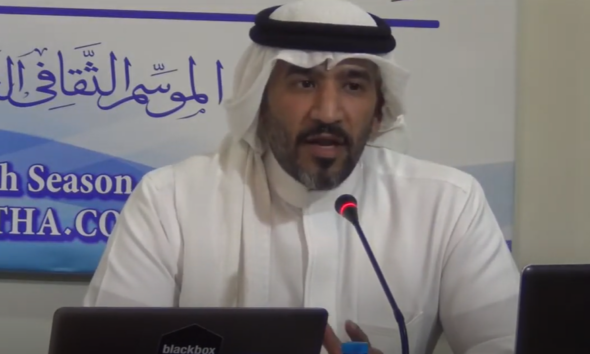
Ahmed Al-Badr the Saudi Businessman
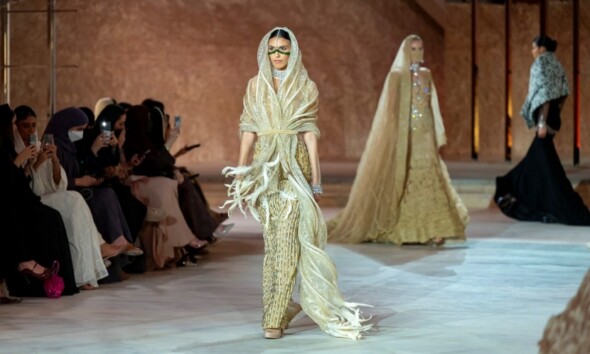
Saudi Designers Ladies’ Role in the Fashion Revival & Vision 2030
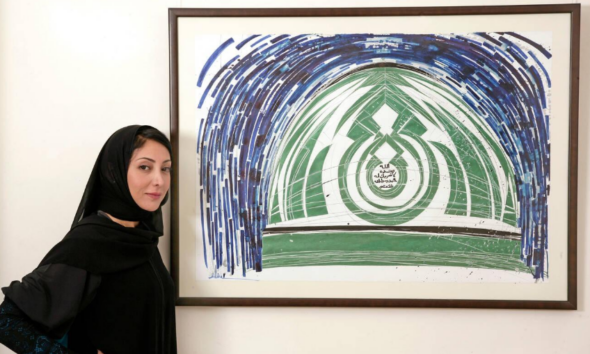
Lina Gazzaz: A Saudi Artist Who Painted History in Modern Colours!
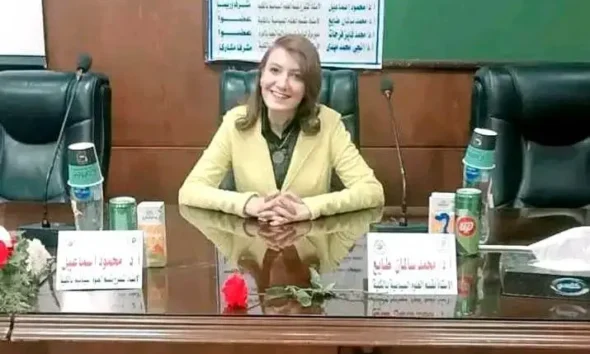
Terrorism Specialist Dr. Shimaa Samir: Multipolarity is Undermining Nuclear Deterrence, and it is Possible to Tame Extremist Ideology!
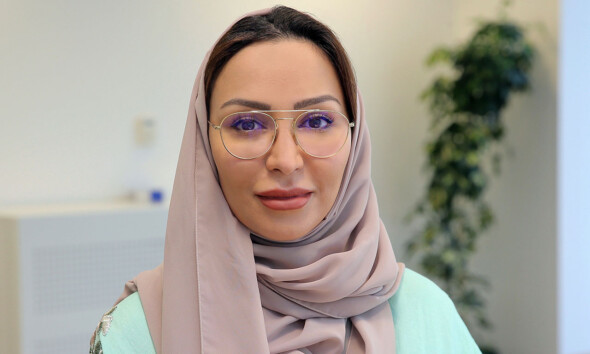
Daniah Orkoubi: A Saudi Entrepreneur and Technological Pioneer
